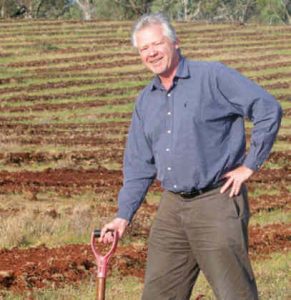David Brand’s career in forestry has been underpinned by a continuous desire for self-improvement and greater achievement. Since starting out in forestry 40 years ago, David has experienced the growth and recession cycles of the industry, but has adapted, grown and even risked his career at times as he has sought to re-invent himself in a never-changing world.
David grew up in Toronto, and received a BSc.F. from University of Toronto in 1978. With itchy feet he hitchhiked to British Columbia and got a job with the BC Forest Service in Campbell River, and then shifted to work for Weldwood Coast Forestry in 1980. Laid off in the recession of 1982, he went back to school at UBC. “I didn’t have stellar grades at U of T,” he says, “and so I was only accepted at UBC as a provisional Master’s degree candidate, but I worked hard, and ultimately was able to complete a PhD. in under three years.”
David’s research put him on track to be a forest scientist. His thesis studied quantifiable factors that could help government assess whether a harvested forest on public land had been successfully regenerated. After completing his PhD, David moved back to Ontario to work for the federal government first at the Petawawa National Forestry Institute, and then in Ottawa. He ultimately rose to the position of Director General of Science and Sustainable Development in 1995.
“It was an exciting time to be working at the national level,” he says. “In addition to implementing the Canadian and International Model Forest Networks as part of Canada’s Green Plan of 1991, I was working in one of the world’s largest forest research organizations at a time when sustainable forest management was becoming the central objective.” David also worked on international negotiations on forests and was the technical chair of the Montreal Process for the conservation and sustainable management of temperate and boreal forests.
In late 1995, the largest manager of commercial forests in New South Wales, Australia, approached David with the opportunity to become their Executive General Manager.“My wife Marion, our two sons and I decided to take a risk and make a three-year commitment to work in Australia,” he says. David stayed with State Forests for 18 months longer than that, helping the organization become more forward-looking, establishing a 20-year plan for sustainable management of native forests and undertaking some of the world’s first carbon offset transactions.
David’s next leap was into a more business-oriented position as a Director with Hancock Natural Resource Group in 2000. Still based in Sydney, David designed and managed investment program integrating forestry and carbon offsets for the firm.
In 2005, David left Hancock to establish his own investment management firm, New Forests. “We manage about 1 million hectares of land and forests valued at almost $6 billion, including plantation forests, timber processing and international timber sales to Asia,” he says. “We offer our investors funds that focus on conservation forestry, climate change mitigation, and sustainable timber plantations. We are now the largest forestry investment manager in Australia, and we are also involved in the United States, New Zealand and Southeast Asia. Needless to say, I travel a lot.”
David’s advice to today’s forestry students is to look for opportunities in moments of disruption. “I got laid off from my job in the 1982 recession, so I went back to school. During the 1993-94 recession there were lots of cutbacks in government and my salary was frozen for three years, so I started looking for opportunities elsewhere, and that led to Australia. The 2008 financial crisis was really hard on us at New Forests, so we adapted the way we did business and moved up to be a full funds management business.”
He adds that students should be prepared to adapt, take risks, and re-skill during their careers. “I think right now is the most extraordinary time to be starting a career in forestry. The challenges of climate change, biodiversity conservation,and watershed management are really exciting,” he says.“Forestry produces sustainable and renewable materials that store carbon during their lifetime of use and that is going to be increasingly in demand. The world keeps changing and sometimes you have to re-invent yourself, and that can feel uncomfortable, but it’s worth the risk.”
